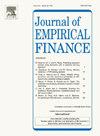气候变化风险与绿色债券定价
IF 2.4
2区 经济学
Q2 BUSINESS, FINANCE
引用次数: 0
摘要
我们研究气候变化风险是否被准确地定价在债券市场。在与气候有关的灾难发生后,绿色债券的表现优于棕色债券,这与投资者对绿色资产偏好的调整是一致的。然后我们检查灾后反应是理性的还是受到行为偏见的影响。我们的研究结果揭示了支持行为解释的两个关键模式:首先,灾害对绿色债券价格的影响是暂时的,因为它在事件发生后的第五个月完全重新吸收;其次,随着灾难的不断重复,这种效应会减弱。总的来说,有证据表明,投资者在灾难发生后立即反应过度,而这种过度反应会随着事件变得不那么突出而消退。本文章由计算机程序翻译,如有差异,请以英文原文为准。
Climate change risk and green bond pricing
We investigate whether climate change risk is accurately priced in the bond market. Green bonds outperform brown bonds after a climate-related disaster, consistent with investors adjusting their preference towards green assets. We then examine whether the post-disaster reaction is rational or affected by a behavioral bias. Our findings reveal two key patterns supporting the behavioral explanation: first, the impact of disasters on green bond prices is temporary as it fully reabsorbs by the fifth month after the event; second, the effect weakens as disasters become more repetitive. Overall, the evidence indicates that investors overreact in the immediate aftermath of a disaster and this overreaction fades as the event becomes less salient.
求助全文
通过发布文献求助,成功后即可免费获取论文全文。
去求助
来源期刊

Journal of Empirical Finance
Multiple-
CiteScore
3.40
自引率
3.80%
发文量
59
期刊介绍:
The Journal of Empirical Finance is a financial economics journal whose aim is to publish high quality articles in empirical finance. Empirical finance is interpreted broadly to include any type of empirical work in financial economics, financial econometrics, and also theoretical work with clear empirical implications, even when there is no empirical analysis. The Journal welcomes articles in all fields of finance, such as asset pricing, corporate finance, financial econometrics, banking, international finance, microstructure, behavioural finance, etc. The Editorial Team is willing to take risks on innovative research, controversial papers, and unusual approaches. We are also particularly interested in work produced by young scholars. The composition of the editorial board reflects such goals.
 求助内容:
求助内容: 应助结果提醒方式:
应助结果提醒方式:


